Filter by
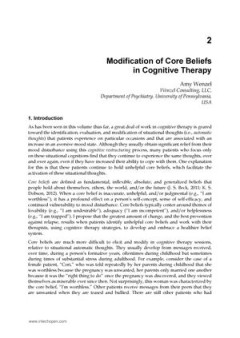
Modification of Core Beliefs in Cognitive Therapy
Modification of Core Beliefs in Cognitive Therapy
- Edition
- -
- ISBN/ISSN
- 9789535103127
- Collation
- -
- Series Title
- -
- Call Number
- -
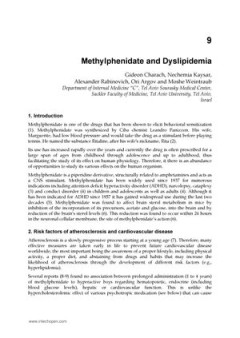
Methylphenidate and Dyslipidemia
Methylphenidate and Dyslipidemia
- Edition
- -
- ISBN/ISSN
- 9789533078687
- Collation
- -
- Series Title
- -
- Call Number
- -
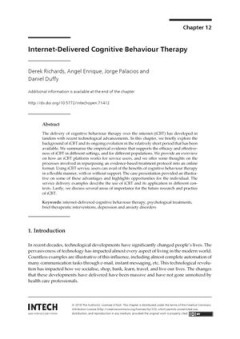
Internet-Delivered Cognitive Behaviour Therapy
The delivery of cognitive behaviour therapy over the internet (iCBT) has developed in tandem with recent technological advancements. In this chapter, we briefly explore the background of iCBT and its ongoing evolution in the relatively short period that has been available. We summarise the empirical evidence that supports the efficacy and effectiveness of iCBT in different settings, and for dif…
- Edition
- -
- ISBN/ISSN
- 9789535139270
- Collation
- -
- Series Title
- -
- Call Number
- -
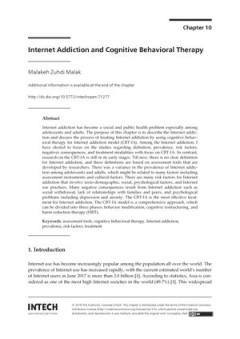
Internet Addiction and Cognitive Behavioral Therapy
Internet addiction has become a social and public health problem especially among adolescents and adults. The purpose of this chapter is to describe the Internet addiction and discuss the process of treating Internet addiction by using cognitive behavioral therapy for Internet addiction model (CBT-IA). Among the Internet addiction, I have elected to focus on the studies regarding definition, pr…
- Edition
- -
- ISBN/ISSN
- 9789535139270
- Collation
- -
- Series Title
- -
- Call Number
- -
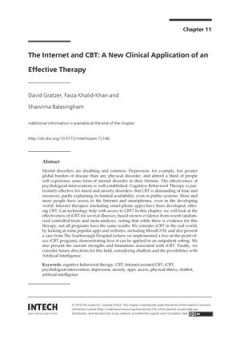
The internet and Cbt a New Clinical Application of An Effective Therapy
Mental disorders are disabling and common. Depression, for example, has greater global burden of disease than any physical disorder, and almost a third of people will experience some form of mental disorder in their lifetime. The effectiveness of psychological interventions is well established. Cognitive Behavioral Therapy is particularly effective for mood and anxiety disorders. But CBT is dem…
- Edition
- -
- ISBN/ISSN
- 9789535139270
- Collation
- -
- Series Title
- -
- Call Number
- -

Internet Addiction and Its Cognitive Behavioral Therapy
Internet Addiction and Its Cognitive Behavioral Therapy
- Edition
- -
- ISBN/ISSN
- 9789535103127
- Collation
- -
- Series Title
- -
- Call Number
- -

Internet Addiction and Cognitive Behavioral Therapy
Internet addiction has become a social and public health problem especially among adolescents and adults. The purpose of this chapter is to describe the Internet addiction and discuss the process of treating Internet addiction by using cognitive behavioral therapy for Internet addiction model (CBT-IA). Among the Internet addiction, I have elected to focus on the studies regarding definition, pr…
- Edition
- -
- ISBN/ISSN
- 9789535139270
- Collation
- -
- Series Title
- -
- Call Number
- -

Imagery Rehearsal Therapy (IRT) Combined with Cognitive Behavioral Therapy (CBT)
In cases of post-traumatic stress disorder (PTSD), nightmares can often persist, even after a cognitive behavioral therapy (CBT) for this disorder. Imagery rehearsal therapy (IRT) is a CBT that targets the treatment of nightmares directly. Objectives: the present study describes the feasibility and the efficacy of combining IRT with first-line, trauma-focused CBT for PTSD. Method: two individua…
- Edition
- -
- ISBN/ISSN
- 9789535139270
- Collation
- -
- Series Title
- -
- Call Number
- -
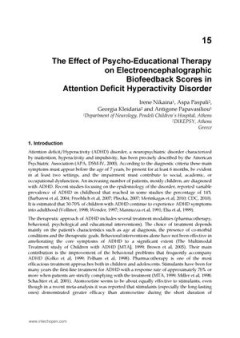
The Effect of Psycho-Educational Therapy on Electroencephalographic Biofeedba…
The Effect of Psycho-Educational Therapy on Electroencephalographic Biofeedback Scores in Attention Deficit Hyperactivity Disorder
- Edition
- -
- ISBN/ISSN
- 9789533078687
- Collation
- -
- Series Title
- -
- Call Number
- -
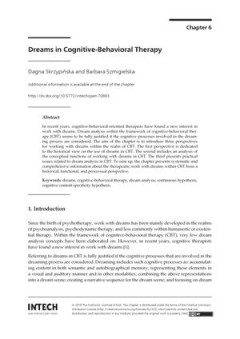
Dreams in Cognitive-Behavioral Therapy
In recent years, cognitive-behavioral-oriented therapists have found a new interest in work with dreams. Dream analysis within the framework of cognitive-behavioral therapy (CBT) seems to be fully justified if the cognitive processes involved in the dreaming process are considered. The aim of the chapter is to introduce three perspectives for working with dreams within the realm of CBT. The fir…
- Edition
- -
- ISBN/ISSN
- 9789535139270
- Collation
- -
- Series Title
- -
- Call Number
- -
 Computer Science, Information & General Works
Computer Science, Information & General Works  Philosophy & Psychology
Philosophy & Psychology  Religion
Religion  Social Sciences
Social Sciences  Language
Language  Pure Science
Pure Science  Applied Sciences
Applied Sciences  Art & Recreation
Art & Recreation  Literature
Literature  History & Geography
History & Geography